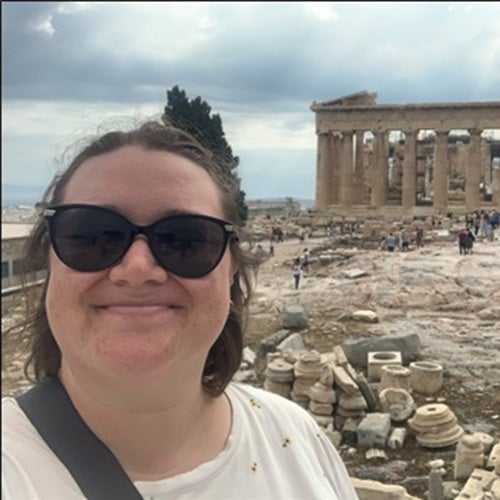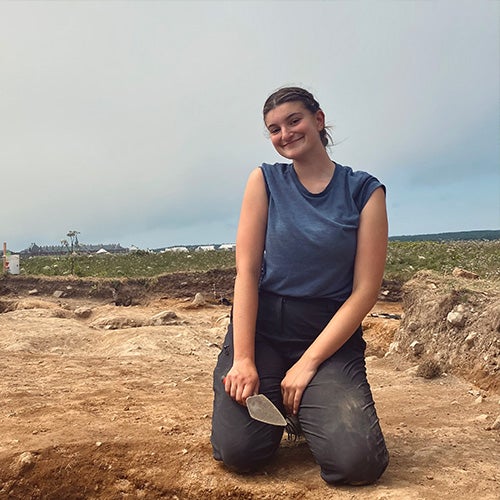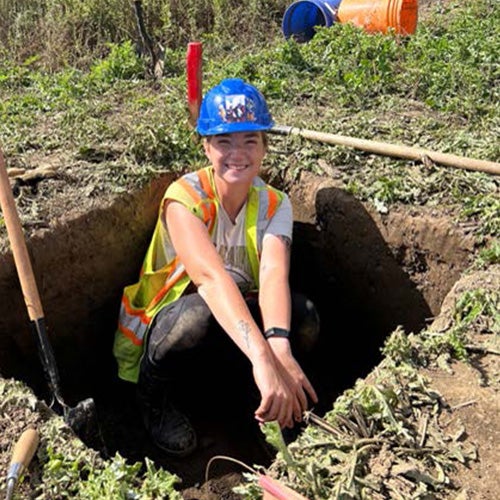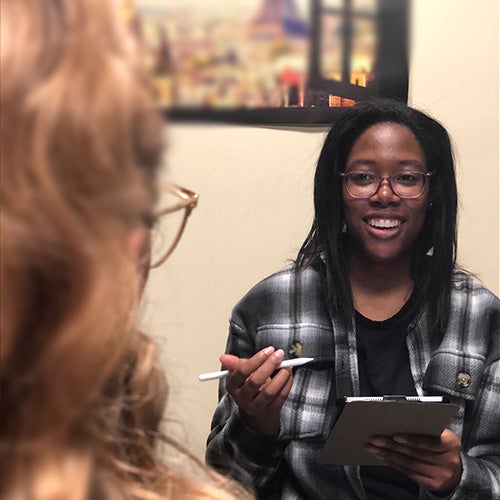Grad Forum 2023
Please join us for the 7th annual Grad Forum where our Public Issues Anthropology MA students will present their research. This event will include a Meet & Greet lunch with grad students and professors.
Presentations
Robyn Wood — Health and Disease in Byzantine Greece: A Dental Analysis of the Temple of Ismenion Apollo, Thebes

This study is an in-depth human dental analysis of the Byzantine site of the Temple of Ismenion Apollo, Thebes, Greece. Over 1,900 teeth were identified and assessed for pathologies including dental caries, calculus and linear enamel hypoplasia, with a goal of determining the number of individuals present and the overall health of the community. The results of this research indicate over 200 people were buried at Ismenion Hill, and support preceding notions of birthing traditions, infant care customs and weaning practices. It further suggests that early childhood was a period of extreme stress that often resulted in death. Interestingly, the results force us to reassess previous speculations that argue Ismenion Hill was the location of a hospital that specialized in the treatment and care of those suffering from leprosy. Consequently, this study demonstrates the profitability of dental analyses, and helps to develop our understanding of human health in an understudied population.
Evengeline Strickland – Childhood health and identity in the Byzantine: A paleopathological analysis of juveniles from Thebes, Greece

Previous research on the Byzantine period cemetery of Ismenion Hill in Thebes, Greece (ca. 5-9th C. CE) revealed high rates of skeletal pathologies across the adult sample. This research examines 59 juveniles from the site. Overall, 27% of juveniles presented with evidence of skeletal and/or dental pathologies. Probable juvenile leprosy, metabolic and hematopoietic diseases, non-specific infections, and dental pathologies were identified. To explore why children were buried in this cemetery, this research examines social, cultural, and environmental factors shaping childhood health in antiquity.
Aparajita Bhattacharya — A Bioarchaeological Secondary Assessment of Pathogen aDNA in Human Metagenomes

Microbial ancient DNA (aDNA) retrieved from archaeological human remains can offer insight into the presence and diversity of ancient pathogens as well as enable broader bioarchaeological investigations of disease load, pathogen evolution, and human–microbe interactions in the past. This study screens for the presence of select pathogen aDNA in human metagenomes published in the NCBI Sequence Read Archive and situates the utility of such secondary bioinformatic approaches and tools within a biocultural research framework. As biological anthropologists increasingly grapple with questions of consent, ethics, and preservation in aDNA research—and turn to other avenues of non-destructive biomolecular analysis—secondary aDNA studies and bioinformatic tools present exciting opportunities to maximise the utility of previously sequenced metagenomic data to creatively explore anthropological questions.
Shannon Brandreth — Maritime Trade of Classical Greece: Examining Contents of Transport Amphorae

Trade practices have long been a concern of anthropological studies, but has fallen out of focus in archaeological research. Much can be learned about trade from material remains, especially those from shipwrecks. For this study, material remains from Classical Greek merchant shipwrecks will be examined to identify commodities contained within transport amphorae. This examination will provide insight into commodities that are well-known for this historical context, such as wines and oils, in addition to other commodities not often discussed or known about. Furthermore, this will highlight the need for archaeological research to engage with anthropological practices of studying trade.
Isabel Clasen —The Importance of Vaccine Hesitancy

Vaccine hesitancy and refusal has a huge impact on public health, and as a growing issue is something that needs to be addressed. While research often focuses on the quantifiable vaccine refusers, it is also becoming increasingly important to gather more information on those who have concerns and are more hesitant, rather than outright refusing. This is because hesitancy, when either left unaddressed or addressed improperly, can lead to refusal. Concerns about vaccines are often framed as being based in ignorance, with the solution being educating the concerned members of the public on their safety and efficacy. Unfortunately, this solution does not address the root issue of vaccine hesitancy and refusal, which has more to do with distrust in the larger institutions that vaccines come to represent, based on various factors, including medical harm. Ignoring the real problem will not make it go away, and it is in everyone's best interest to attempt to mitigate the problem in its earlier stages, rather than trying to do damage control once it has gone too far. It is not an easy task, but arguably, a necessary one.
Wynne Manning – Trust, Care, Attunement: An Anthropological Study of Patient-Doctor Relationships

The study explores how patients in Ontario trust doctors and how the trust is influenced by different factors. It uses interviews and diaries kept by respondents to gain insight into how their experiences shape their trust in doctors. The notion of attunement is used to examine how doctors and patients connect with each other. Particular attention is paid to the diverse temporalities of doctor-patient interactions.
Camila Font – Grids and groups: Live-in domestic work in Costa Rica

In a political economic context of neoliberal coloniality, this project considers ethnographic research of practices of live-in domestic work in Costa Rica. Employers often agree with, or encourage, domestic workers to have their family members also live with them in their place of employment. Employees, employers, and the constellations of relations that they bring to their encounter speculated upon a labour structure are translated, negotiated, and reimagined through the intimacy of sharing, in tension, domestic space. The seduction of kinship and its associated powers is rewritten across fractally recursive chains of events that magnify, distort and obfuscate circulations of power in relating as limited kin. This brings into awareness how kinship politics reveal structured interrelations of inequality, marginalization, and stigmatization present in the practices of commitment to the care of others, the recognition of others as radically an-other, and in entanglement, as part of the self.
Join us
The Graduate Forum is free to attend and all are welcome! Join us and learn more about these new research topics!
Parking is available in Lot C. Cost is $5.00